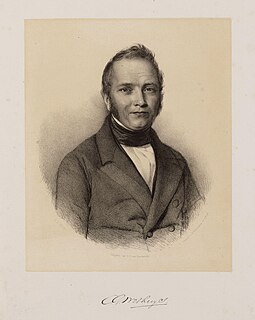
Abraham Jacob van der Aa was a Dutch writer best known for his dictionaries, one of notable people and the other of notable places in the Netherlands.
Isidoor Teirlinck was a Belgian writer. He is best known for his work on folklore.
Frans Jozef de Cort, was a Flemish writer.

The Directorate-General for Public Works and Water Management, founded in 1798 as the Bureau voor den Waterstaat, is part of the Ministry of Infrastructure and Water Management of the Netherlands, the former Ministry of Transport, Public Works and Water Management. Its role is the practical execution of the public works and water management, including the construction and maintenance of waterways and roads, and flood protection and prevention. The agency was also involved in the construction of big railway projects such as the Betuweroute and the HSL-Zuid.

Wilhelmina Drucker was a Dutch politician and writer. One of the first Dutch feminists, she was also known under her pseudonyms Gipsy, Gitano, and E. Prezcier.

De Eglantier was a chamber of rhetoric in Amsterdam that arose in 1517 or 1518, possibly as a continuation of older chambers of rhetoric. It is one of the most famous chambers of rhetoric. Its insignia consisted of a thriving Eglantine Rose in the form of a cross from which a Christ Figure was hanging. The corresponding slogan was "In Love, Flourishing". The name derives from a romantic reference to the poem Beatrijs, where the lovers met by the wild rose. One of the most important leaders of the chamber was Hendrik Laurenszoon Spiegel. Other prominent members were Laurens Reael, Roemer Visscher and Dirck Volckertszoon Coornhert.

Abraham de Vries was a Dutch Mennonite minister, author on literature and member of several societies.

Cornelis Loosjes was a Dutch Mennonite teacher and minister.

Klaas Sybrandi, also spelled as Sijbrandi, was a Dutch Mennonite minister, author, translator and involved with several societies and foundations.
Maurits Gysseling was an influential Belgian researcher into historical linguistics and paleography. He was especially well known for his editions and studies of old texts relevant to the history of the Dutch language, and also for his very detailed analyses of historical place-names and their probable origins.

William Henry James Weale was a British art historian who lived and worked most of his life in Bruges and was one of the first to research the Early Netherlandish painting extensively. He was also a pioneer in the study of early bookbinding, and a staunch promoter of Gothic Revival architecture.
Titia Brongersma was a Frisian poet of the late 17th century. Her book, De bron-swaan, was published in 1686 and is virtually the only trace of her literary activity. She also gained prominence for excavating a dolmen at Borger, Netherlands in 1685.

Jan Vaerman was a Flemish mathematician. He worked as a school teacher in Bruges and, between 1693 and 1717, in Tielt. He wrote about geometry, arithmetic, geography, planimetry, astronomy, navigation, defensive walls and solar watches.
Alfons Frederik Siffer (1850–1941) was a Belgian politician and publisher of Catholic works, including the cultural reviews Het Belfort and Le Magasin littéraire et scientifique.
Amaat Honoraat Joos was a Flemish priest and prelate who became well known as an educationalist, dialectologist and folklorist.

Jhr. Johannes Cornelis de Jonge was a Dutch Rijksarchivaris, historian, and politician. He is best known for his encyclopedic Geschiedenis van het Nederlandsche Zeewezen, a naval history of the Netherlands that was based on the Dutch naval archives, a large part of which were destroyed in a fire in the archives of the Dutch Department of the Navy in 1844. By default therefore this history had to come in the place of the lost primary documents.

Melati van Java was the pen name of Nicolina Maria "Marie" Sloot. She was an Indonesian-born Dutch writer. During the period around the start of the 20th century, her novels were popular with the Dutch public.

Frederik Willem van Eeden was a Dutch amateur botanist. He was the father of the writer Frederik van Eeden.

Carel Godfried Withuys was a Dutch writer and poet. Much of his work was patriotic in nature, especially during and after the Belgian Revolution of 1830.

Andreas Johannes Ludovicus baron van den Bogaerde van Terbrugge was governor of North Brabant and also an author and fanatic art collector.














